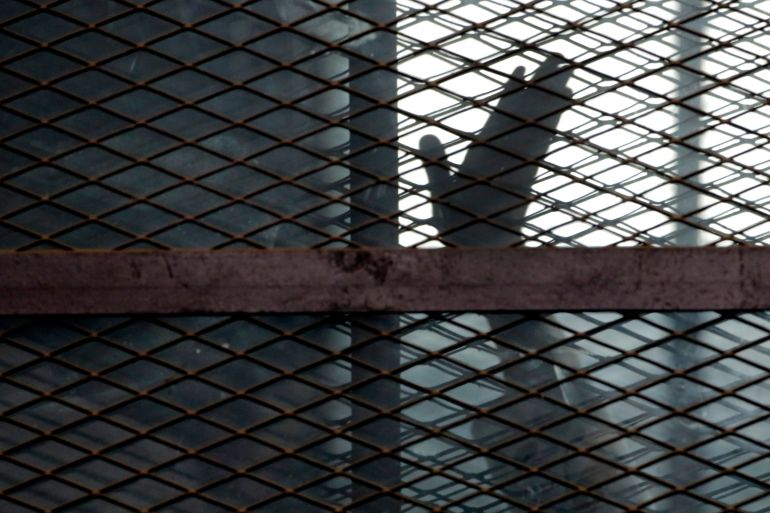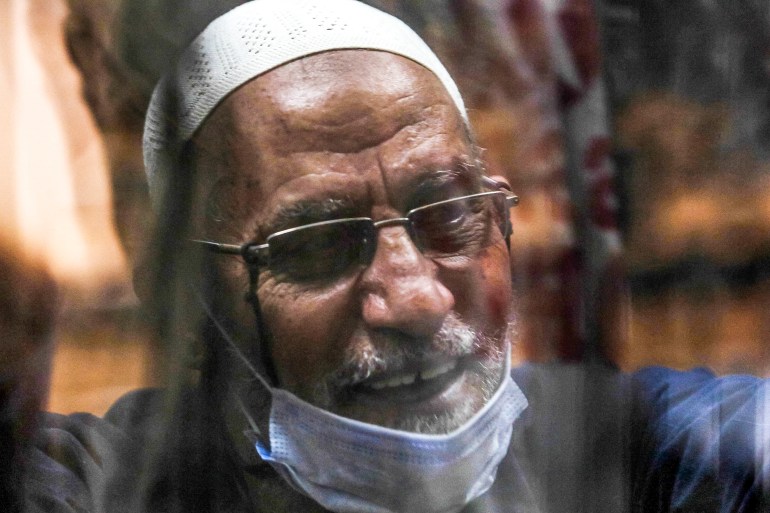Egypt upholds life sentences for 10 Muslim Brotherhood figures
Among those sentenced is the group’s leader, Mohamed Badie, on charges related to killing policemen and organising mass jail-breaks during Egypt’s 2011 uprising.

Egypt’s highest appeals court has upheld the life sentences of 10 leaders of Egypt’s outlawed Muslim Brotherhood, including the group’s head, the state-owned MENA news agency reported.
The ruling on Sunday upheld the 2019 conviction by a Cairo criminal court of all 10, including the group’s leader, or supreme guide, Mohamed Badie, of charges related to killing policemen and organising mass jail-breaks during Egypt’s 2011 uprising. That revolt culminated in the overthrow of longtime ruler Hosni Mubarak.
Keep reading
list of 4 itemsEgypt arrests TikTok star after ‘human trafficking’ conviction
Egypt upholds death penalty for 12 Muslim Brotherhood members
Rights group urges Egypt to free detained mother of inmate
The defendants were found guilty of helping about 20,000 prisoners escape, and of undermining national security by conspiring with foreign armed groups – the Palestinian group, Hamas, and Lebanon’s Iran-backed Hezbollah.
Meanwhile, the Court of Cassation acquitted eight middle-rank leaders of the Muslim Brotherhood, who were sentenced earlier to 15 years in prison.
All of the sentences, which the court considered on appeal, are final.

Sunday’s rulings upheld the latest of several life sentences for Muslim Brotherhood leaders. They had gone on trial several times since the crackdown on the group in 2013 following the military coup that deposed Egypt’s first democratically elected president, the late Mohamed Morsi.
Morsi had hailed from the group’s ranks. His one-year rule had proven divisive and provoked nationwide protests.
The coup to overthrow Morsi was led by now-President Abdel Fattah el-Sisi, who outlawed the Brotherhood in late 2013 and has overseen a wide-ranging crackdown, jailing thousands of its supporters.
Tens of thousands of Egyptians have been arrested since 2013, and many have fled the country. Morsi himself was a defendant in the prison-break case, but he collapsed in a courtroom and died while appearing in a separate trial in the summer of 2019.
Last month, the Court of Cassation upheld the death sentence for 12 people involved in a 2013 protest, including several senior Muslim Brotherhood leaders.
Philip Luther, Amnesty International’s research and advocacy director for the Middle East and North Africa, said at the time that the death sentences “cast a shadow over the country’s entire justice system”.
Egypt has become the world’s third most frequent executioner, Luther said, adding that at least 51 men and women have been executed in 2021 so far.
Similarly, other rights groups in Egypt and abroad have denounced the trials and death sentences as a mockery of justice.
The Muslim Brotherhood, founded in Egypt in 1928, calls for Islam to be at the heart of public life.
It established itself as the main opposition movement in Egypt despite decades of repression, and has inspired spinoff movements and political parties across the Muslim world.
But it remains banned in several countries including Egypt for its alleged links to “terrorism”.